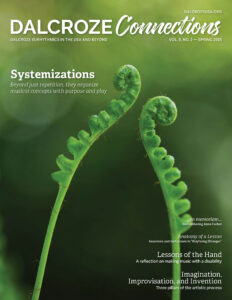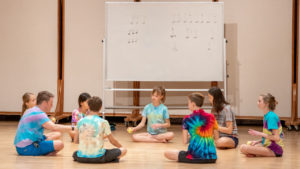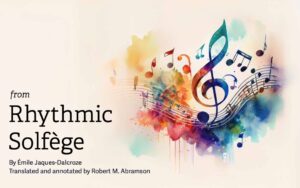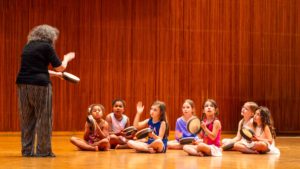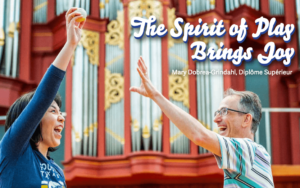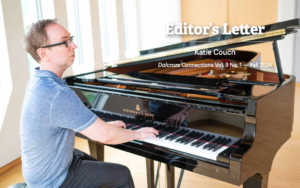“Dalcroze Connections”
“Dalcroze Connections” Vol. 9 No. 2 Now Available
The spring 2025 edition of our online magazine Dalcroze Connections is now available for all to read! Dalcroze Connections is the official magazine of the United States Dalcroze community and seeks to inform, inspire, and educate Dalcroze practitioners at all levels. It is published twice yearly, and prepared by the Publications Committee. This issue was…
Read MoreLesson Plan for 3rd-5th graders
This is a lesson plan I might use in the beginning of the year in a community music school. Where I teach, some students will be brand new to music lessons and Dalcroze, some will be experienced at both, but most will be in between. I try to plan activities that will allow me to…
Read MoreRhythmic Solfège
Translated by Robert M. Abramson Foreword Rhythmic solfège is not in competition with other systems of solfège. It is a complement to them, and an indispensable one. In fact, in the better treatises on the subject, classical or modern, the exercises are given with the sole intention of teaching the laws of pitch and meter,…
Read MoreInspired by Dalcroze: Beginning a Teacher Training Journey
One day, I found myself interested in the question of how young children can grasp complex musical concepts at such an early age. My curiosity increased when I watched my four-year-old son, Arthur, engage with music in a way that was surprising and instinctive. He was not only listening to the music; he was fully…
Read MoreThe Mystery of the Espèce
Introduction Émile Jaques-Dalcroze used the term espèce (French for “species”) to describe all varieties of pitch sets, including dichords, trichords, and heptachords (among others), which outline and define all qualities of seventh chords. To understand the espèces requires a thorough understanding of the do-to-do scales, pitch sets (dyads, trichords, etc.), and the four species of…
Read MoreExecutive Director’s Letter
Welcome to an exciting new year with Dalcroze USA! Earlier this year, we joined together at our 2024 National Conference in Oberlin, OH, and are embracing the momentum it generated. This fall, as we welcome new members and newly inspired volunteers, I look forward to fresh ideas that will expand the reach and impact of…
Read MoreThe Spirit of Play Brings Joy
One summer afternoon, I sat on my porch watching some neighborhood children playing. Their mission was to find roly-polies under a rock, and they had to find a way to move the rock to do so. One pretended he was Superman and tried to lift it. Another tried to push it. The third kicked. Each…
Read MoreEditor’s Letter
I recently sat down at the piano to noodle. I was having trouble coming up with a topic for an article I was writing, and I hoped that improvising would help the brainstorming process. As the music set in, I found myself revisiting summer Dalcroze memories. The national conference at the scenic and historic Oberlin…
Read MoreMovement Training for Dalcroze Eurhythmics Specialists
My introduction to Dalcroze eurhythmics came when, in 1997, Lisa Parker hired me to teach movement in the Dalcroze program at the Longy School of Music of Bard College. In an effort to design a movement course that served Dalcroze students, I started taking, and immeasurably enjoying, all the eurhythmics, solfège, improvisation, and pedagogy classes…
Read MoreImprov Exchange: Dewdrops
In every issue of Dalcroze Connections, we provide ideas for a brief composition that might be used in the classroom. Use this as inspiration for your own improvisations and share the results! As improvisers, it’s important to take inspiration from any and everything: life experiences, art of all kinds, poetry. In this issue, we present…
Read More